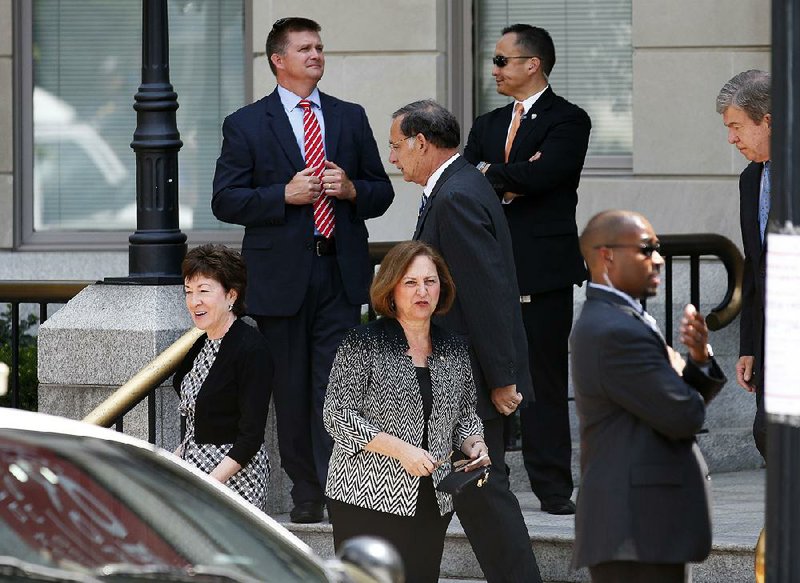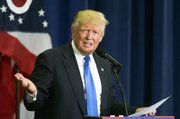WASHINGTON -- Donald Trump made clear that he won't change his tone or message as he met with Republican lawmakers Thursday, telling them they all share the same Republican Party goals.
FULL ELECTION COVERAGE
RELATED ARTICLE
http://www.arkansas…">For state's 6, Trump visit mostly good
Despite the businessman's reassurances, several senators withheld support after a tense meeting with the presidential candidate.
Trump repeatedly called for unity in his second Capitol Hill tour in three months, but he also threatened would-be party critics on a day that was designed to rally anxious Republicans behind him. Deflecting questions about his discipline in public comments, Trump insisted his recent praise for former Iraqi leader Saddam Hussein was taken out of context and ignored questions about a campaign tweet that has been called anti-Semitic, according to Republicans who attended the two private meetings.
Sen. Jeff Flake of Arizona declined to address reports that Trump threatened to attack him politically during a testy exchange that Sen. John McCain of Arizona said "everybody was talking about" afterward.
When Flake stood up and introduced himself, Trump told him, "You've been very critical of me."
"Yes, I'm the other senator from Arizona -- the one who didn't get captured -- and I want to talk to you about statements like that," Flake responded, according to two Republican officials.
Flake was referring to Trump's comments last summer about the military service of McCain, who was a prisoner of war during the Vietnam conflict. Trump questioned whether McCain was a war hero because he was captured.
Asked in a Senate hallway later about his exchange with Trump, Flake declined to elaborate.
"No, I'll just leave it," he told reporters, adding "my position remains, I want to support the nominee. I really do. I just can't support him given the things that he's said."
House GOP Ovations
There was a more cooperative tone inside Trump's meeting with House Republicans. According to two members in attendance, the conversation was fairly subdued and focused on border security, the need to protect the Second Amendment and the high costs associated with President Barack Obama's health care law.
"There was no talk of pivoting. There was no talk of changing his style or anything like that," said Rep. Peter King of New York. "I think you have to expect that you're going to get Donald Trump. But he showed today that he could be Donald Trump and still work with Republicans."
Rep. John Mica of Florida emerged from the meeting saying Trump had been greeted favorably by House Republicans, who gave him "two or three" standing ovations while he was present.
Speaker Paul Ryan of Wisconsin said the meeting was "great" during his weekly news conference.
"What I thought was especially helpful today was our members just got access and got to ask their questions and talk about their issues," said Ryan. "I thought he did a great job engaging with our members, and I think our members appreciated it."
Ryan said members talked to Trump about the constitutional roles of the president and Congress, reducing regulations and overhauling the tax code -- all issues included in the "A Better Way" policy blueprint House Republicans have rolled out in recent weeks.
"We clearly have a presumptive nominee who wants to work with us on moving this agenda forward," Ryan said.
At one point during the meeting, Trump turned directly to Ryan and seemed to acknowledge the lingering concerns. "If you read the headlines in the paper, I could see why some folks might be worried," Rep. Chris Collins of New York, a supporter, recalled Trump saying.
That explanation was well-received.
Trump also emphasized his plan to repeal Obama's health law, reduce regulatory burdens, overhaul tax laws and remake the Supreme Court as "one that is more reflective of the values of the country," according to Rep. Tom Price of Georgia.
Despite House leaders' positive statement about the gathering, several GOP lawmakers leaving the morning meeting said they are still unconvinced that Trump can be a good standard-bearer for the party.
Others, too, were not impressed, especially when Trump responded to a question about whether he would defend Article 1 of the Constitution on the separation of powers.
Trump said he would defend articles "1, 2, 3 to 12," said Rep. Mark Sanford of South Carolina. There are only seven articles.
"I think it was the normal stream of consciousness that's long on hyperbole and short on facts," Sanford said, adding, "He may be loose on some facts, reckless on some, but there's not malicious intent there."
"If you look at the trajectory of his unforced errors, he's getting better," said Rep. Bill Flores of Texas. "I mean, he's not where we want him to be, but he's getting better."
Some Senators Wary
Trump later met with Sen. Ted Cruz of Texas and Republican National Committee Chairman Reince Priebus, said two people familiar with the matter, after meetings with House and Senate members.
Cruz, who campaigned against Trump for the party's nomination, announced Thursday that he would speak at the Republican National Convention on July 18.
But the Republican Party remains deeply divided ahead of the Cleveland gathering.
Many high-profile Republicans are refusing to go. Among them are former Presidents George H.W. Bush and George W. Bush, 2012 nominee Mitt Romney and former presidential candidates Sen. Marco Rubio of Florida and Gov. John Kasich of Ohio.
Sen. Orrin Hatch of Utah does plan to attend, but he shared his concerns about Trump's campaign.
"I hope he will focus less on personality and divisive rhetoric and more on policies and a capacity to govern effectively," Hatch said after the Senate meeting.
Sen. Ben Sasse of Nebraska, a Trump critic, was less polite.
James Wegmann, a spokesman for Sasse, said the meeting did not change the senator's mind.
"Mr. Sasse continues to believe that our country is in a bad place and, with these two candidates, this election remains a dumpster fire," he said.
Flake, who has not endorsed Trump, objected to Trump's statements about Mexican-Americans and his attacks on a federal judge about his Hispanic descent. He described Trump's language as offensive and wrong. Trump responded dismissively.
Trump also denounced Sen. Mark Kirk of Illinois, who wasn't in Thursday's meeting with Senate Republicans and had withdrawn his endorsement of the nominee over his inflammatory comments about the judge. Trump said Kirk should not have rescinded his support, according to one attendee.
Kirk, who is running for re-election, said later that it was his understanding Trump had called him a "loser" and that he did not believe that the candidate could win Illinois in the fall.
"We haven't seen a personality like his too much in the Midwest. Eastern, privileged, wealthy bully," said Kirk.
Collins said he blamed Trump's missteps, including the outcry over his Saddam Hussein comments, on Democrats and unfriendly journalists.
"His point was: They set us up," Collins said. "And we just need to make sure we stay together."
There were also signs of skepticism.
Rep. Adam Kinzinger, R-Ill., said he could sense some hesitation in the room, his own included. Kinzinger, who served in Iraq and Afghanistan, said Trump's recent remarks about Saddam were not helpful.
"I'm not a Never Trump guy, I'm a Republican -- I want to support him," he said. "But things like saying the Saddam Hussein comment are not helping me to get there."
Information for this article was contributed by Steve Peoples, Erica Werner, Richard Lardner, Jill Colvin, Alan Fram and Sarah Grace Taylor of The Associated Press; by Alan Rappeport, Jennifer Steinhauer, Maggie Haberman, Emmarie Huetteman and Alexander Burns of The New York Times; and by Sean Sullivan, Philip Rucker, David Weigel, Paul Kane, Karoun Demirjian and Kelsey Snel of The Washington Post.
A Section on 07/08/2016

